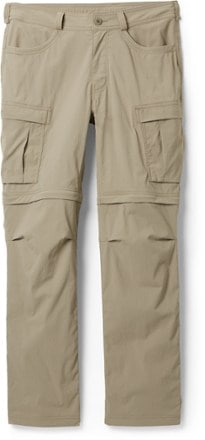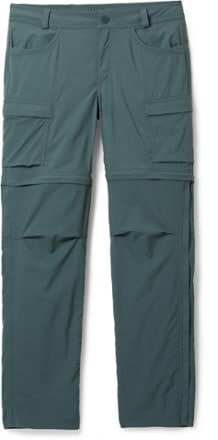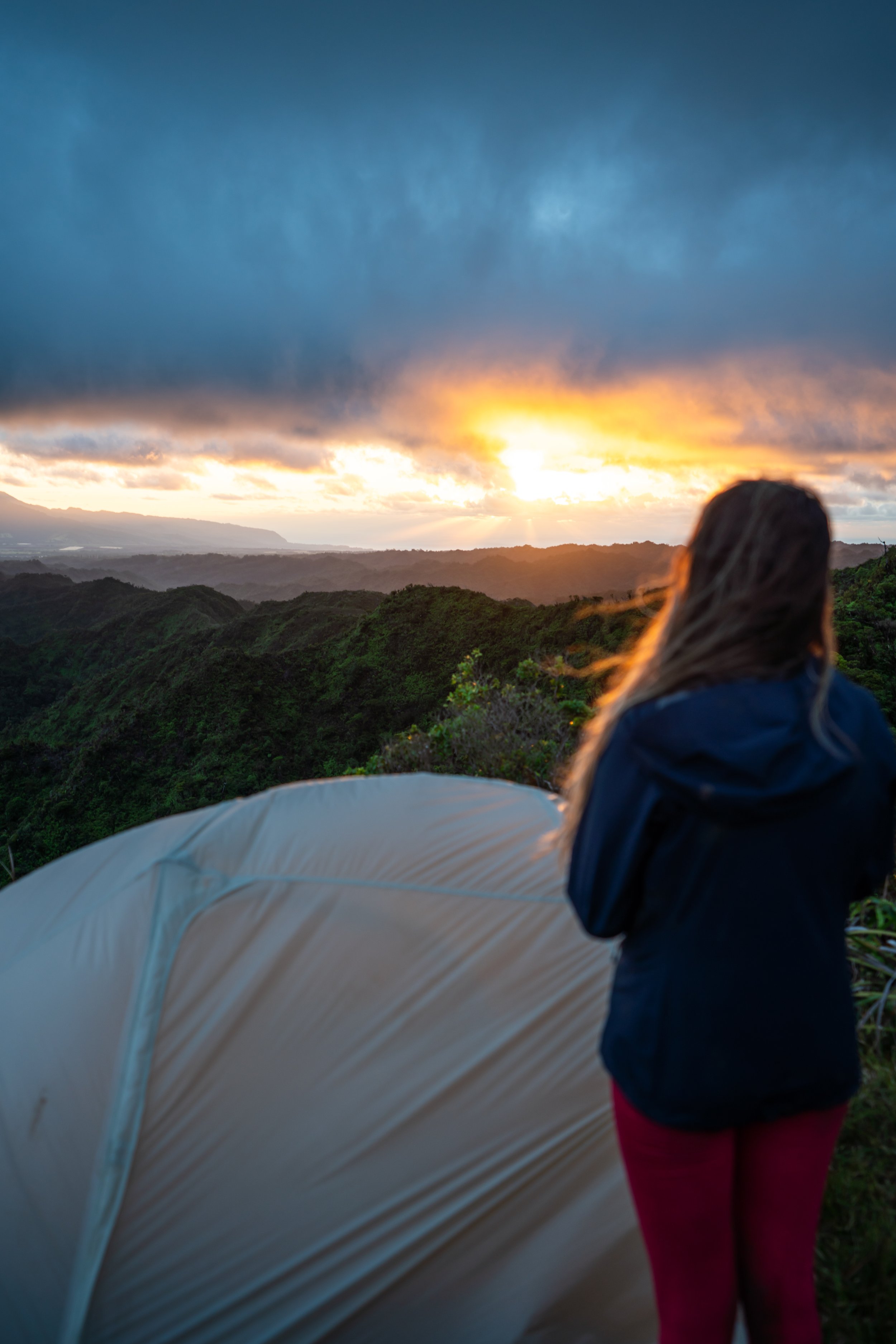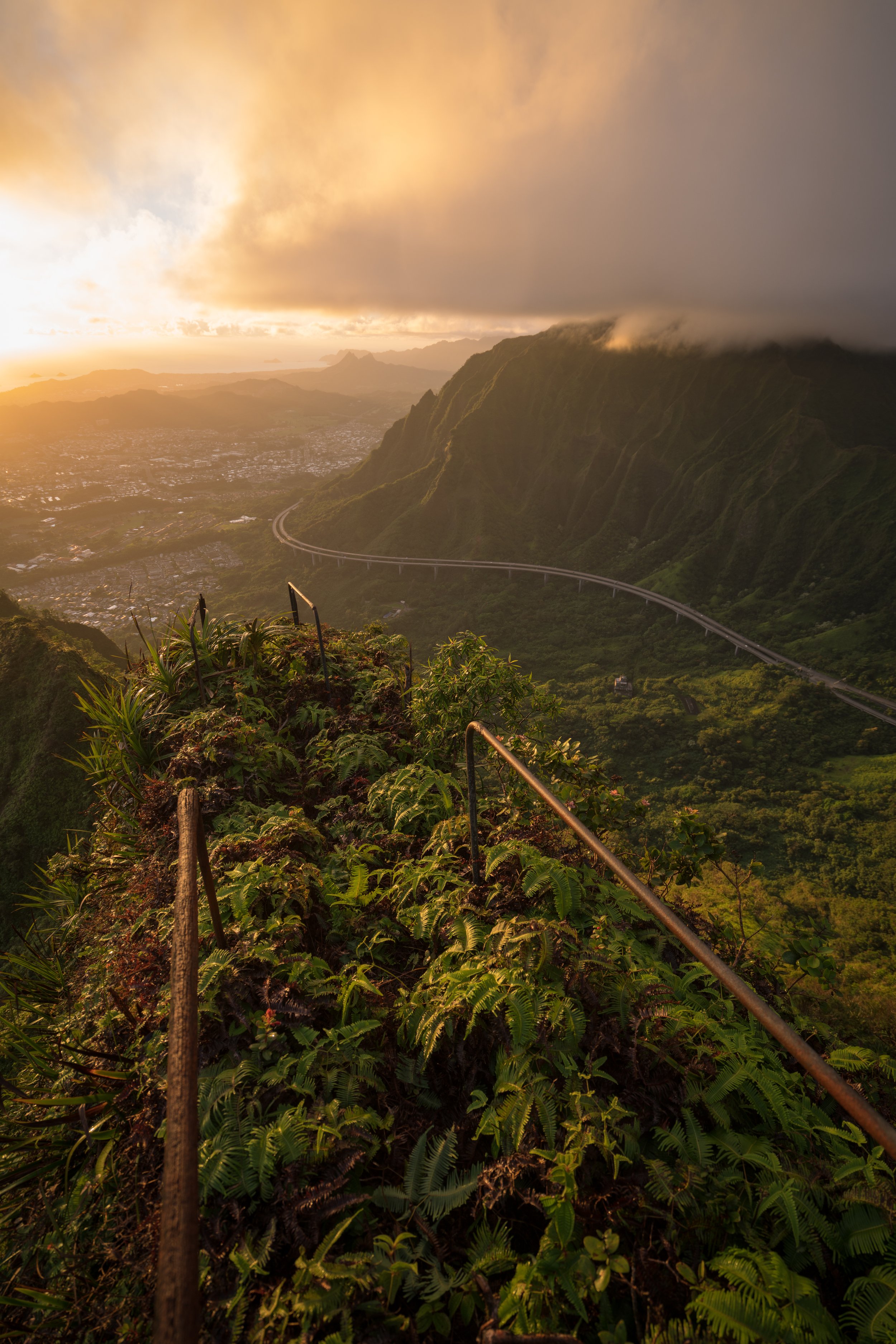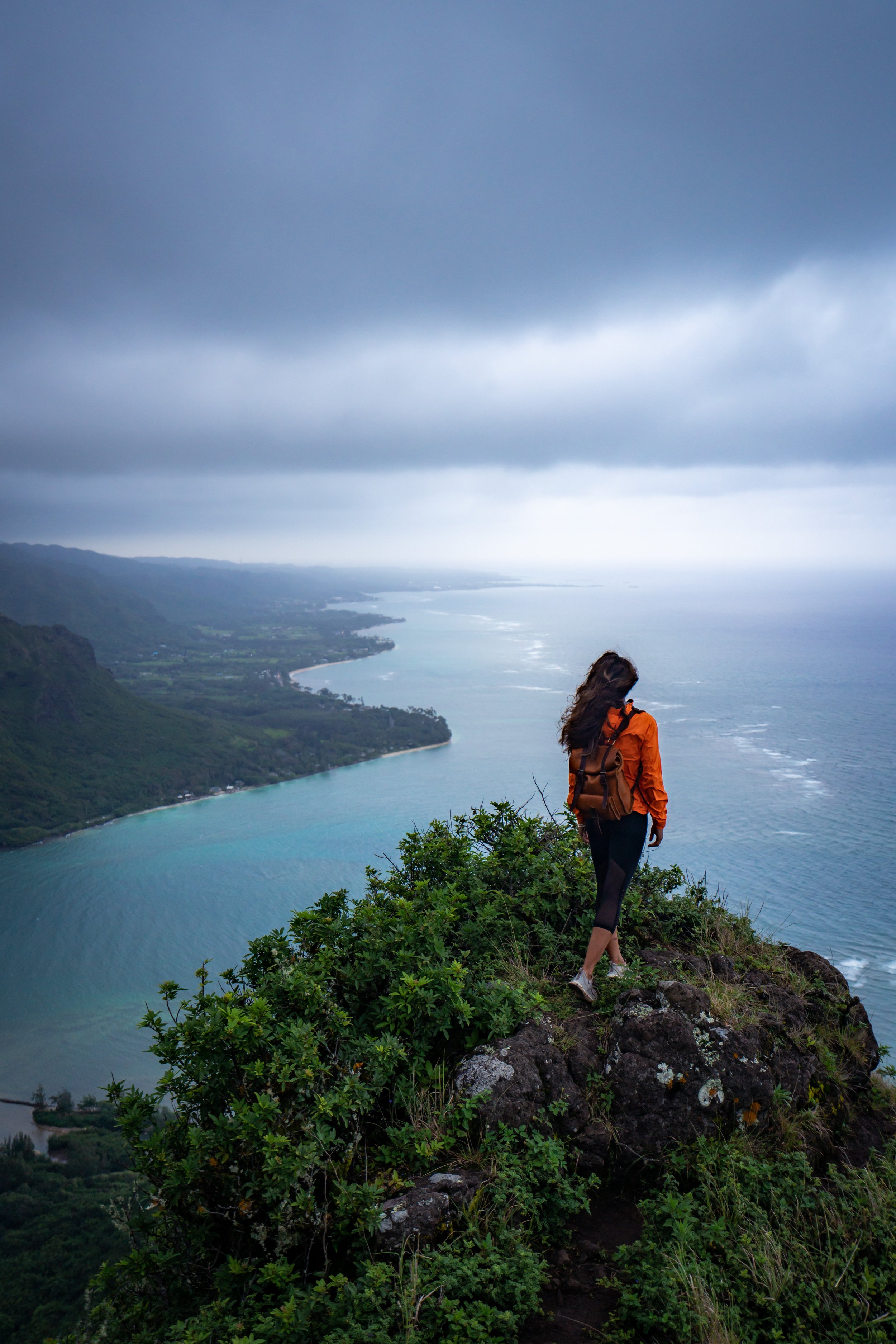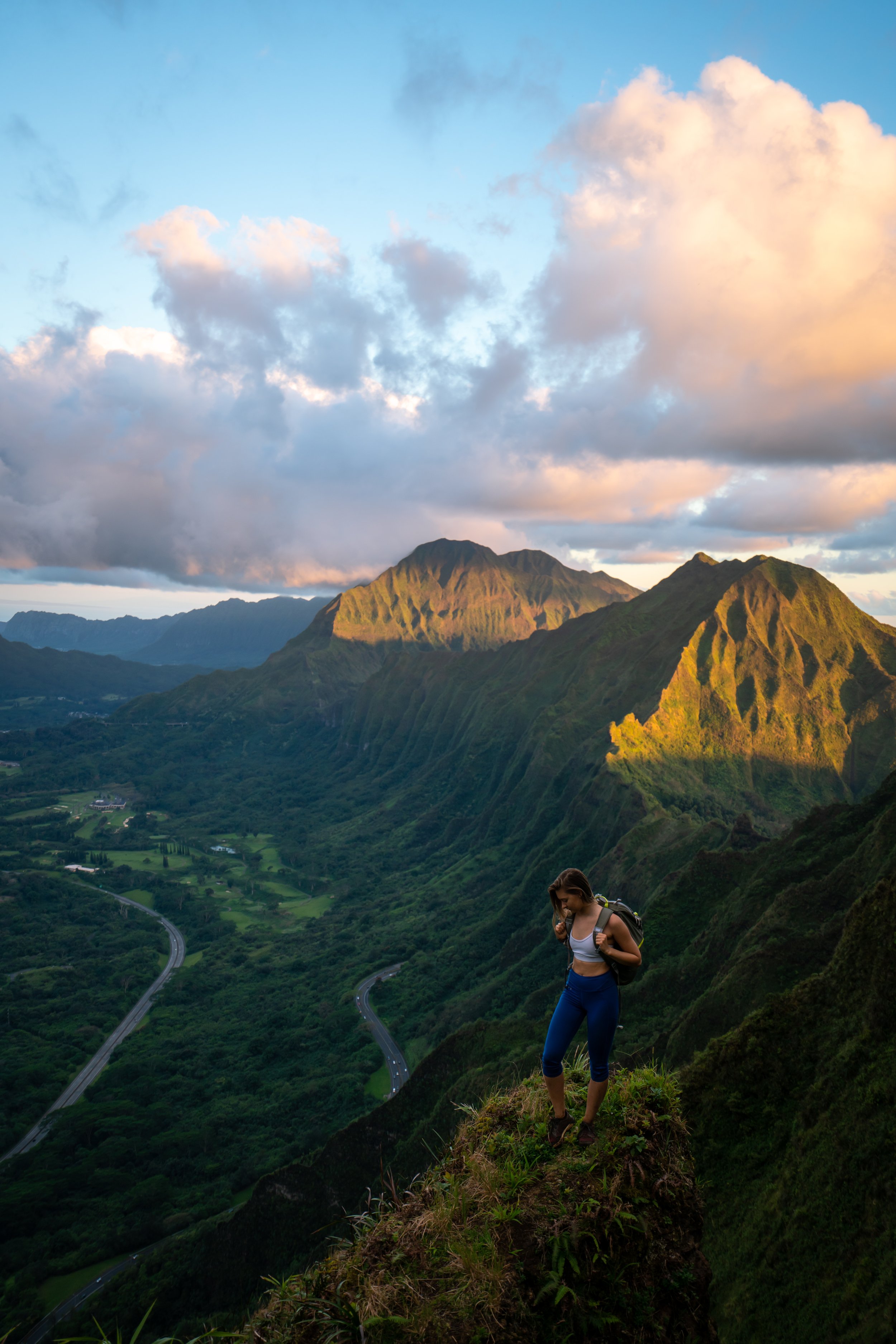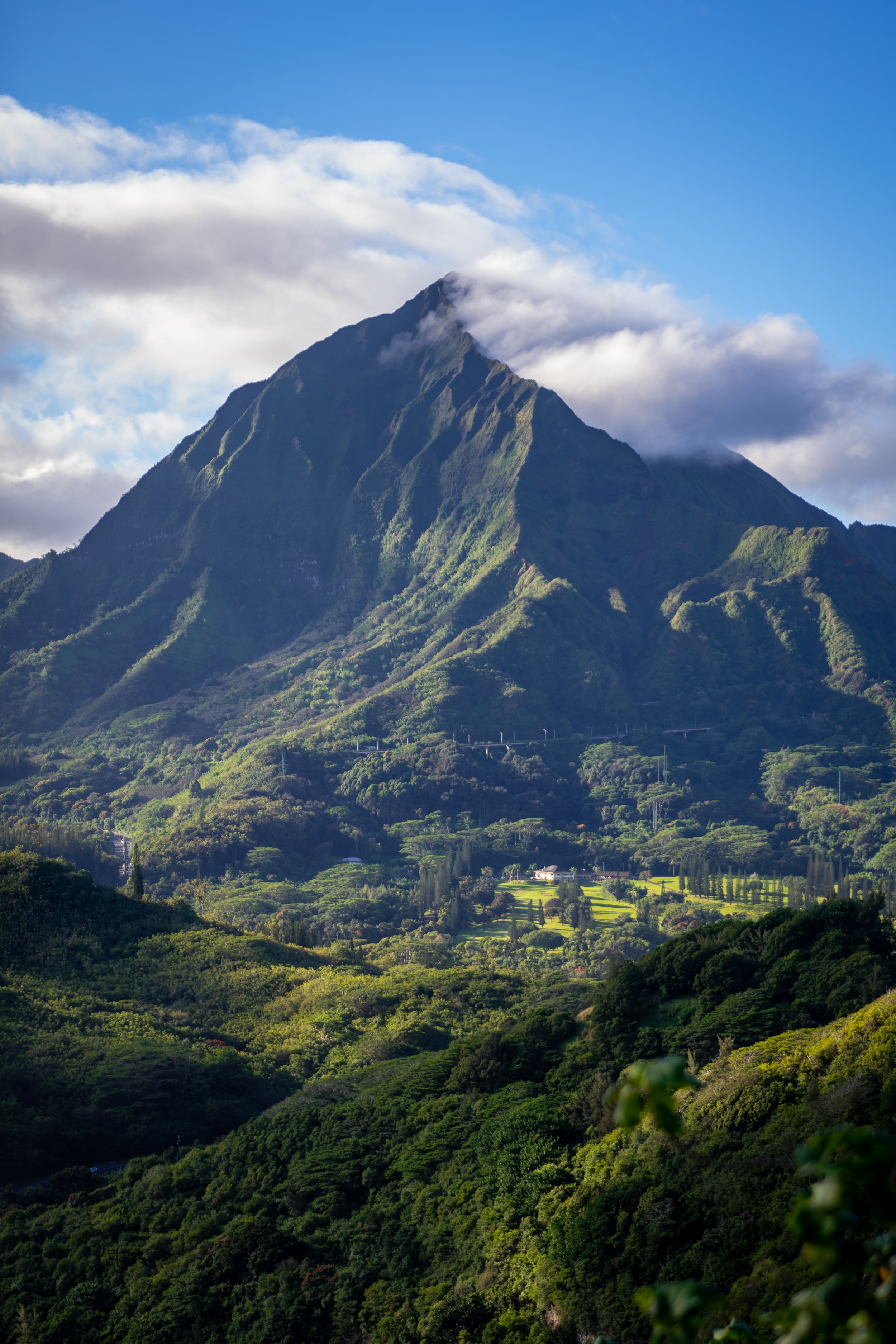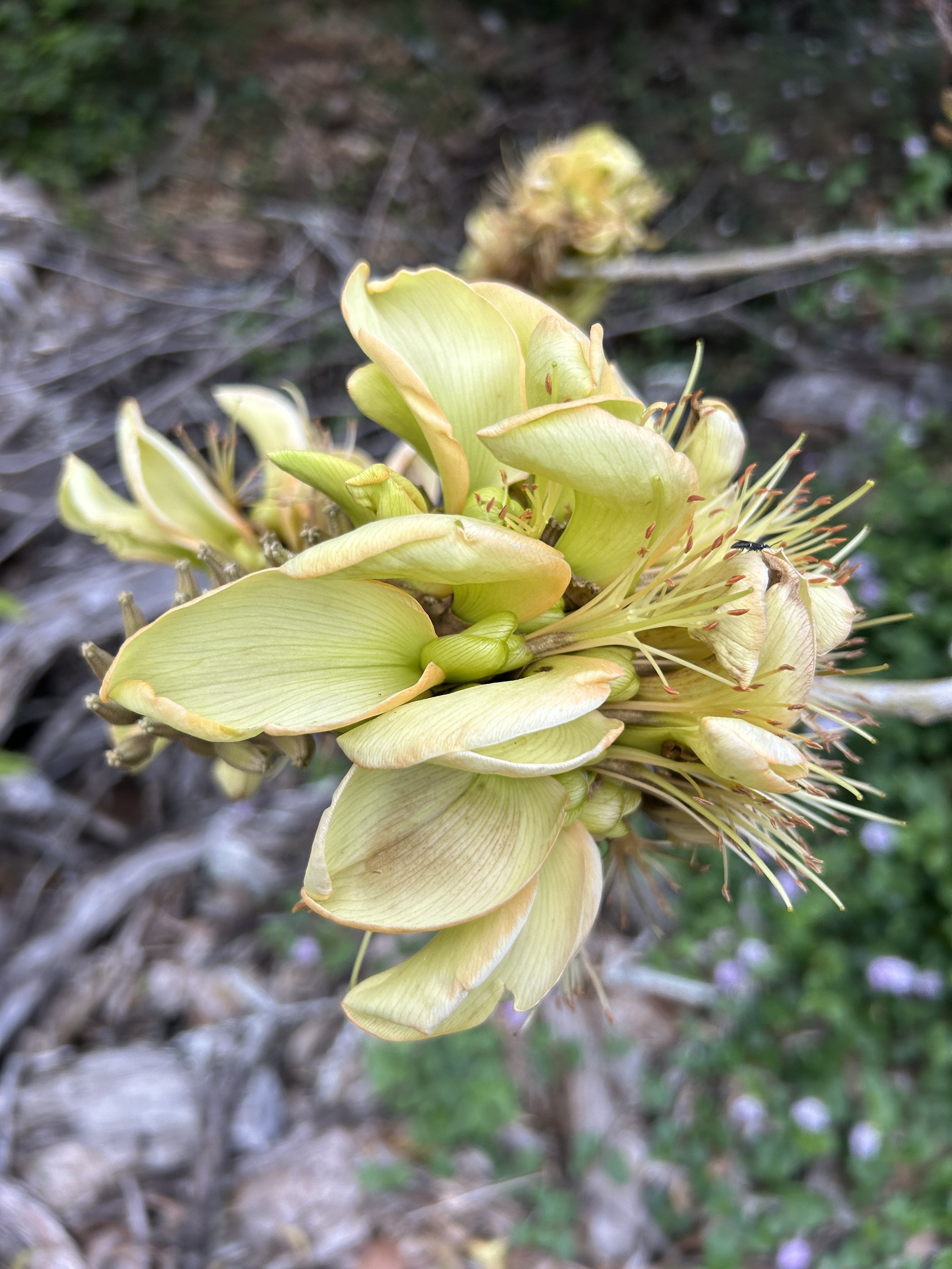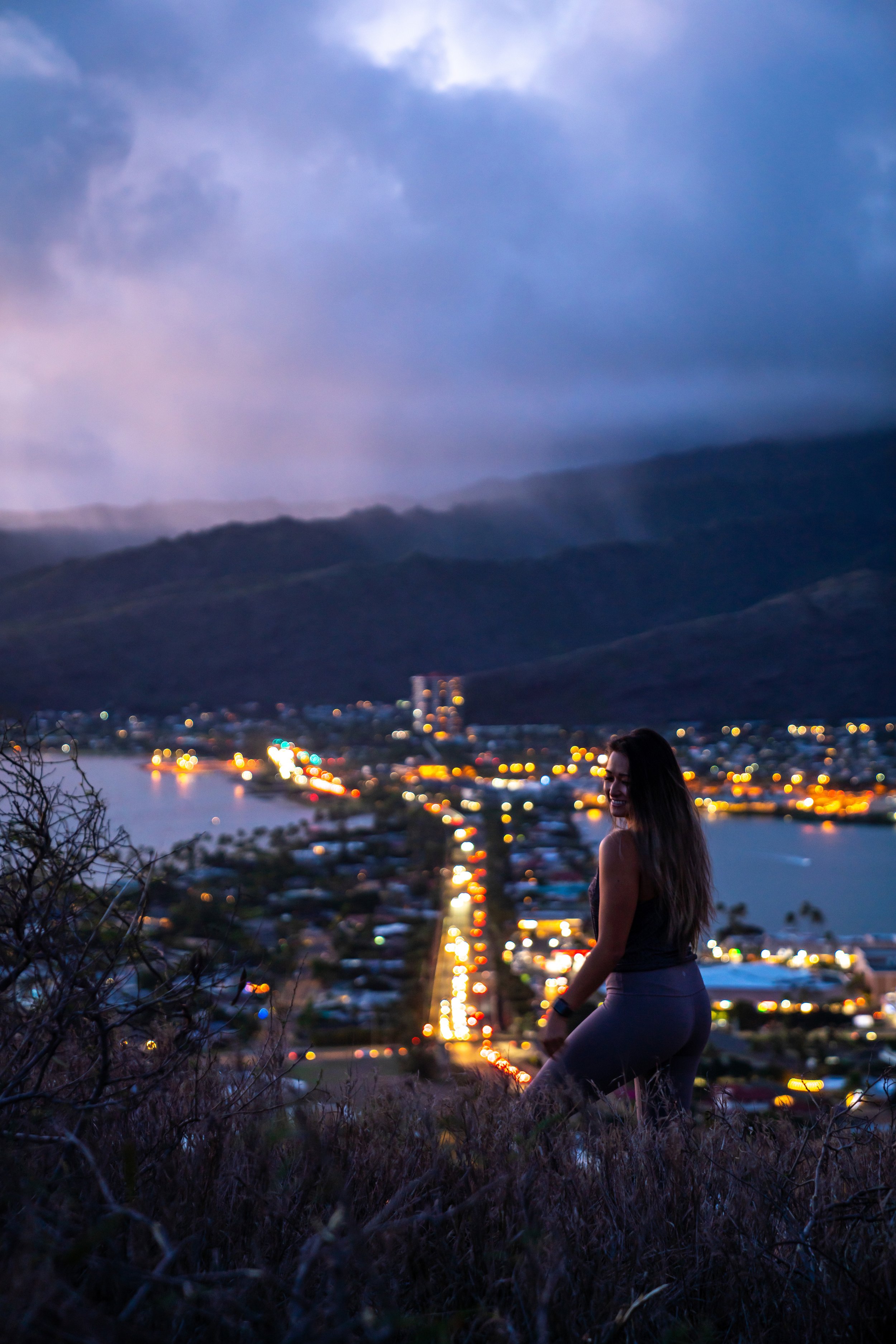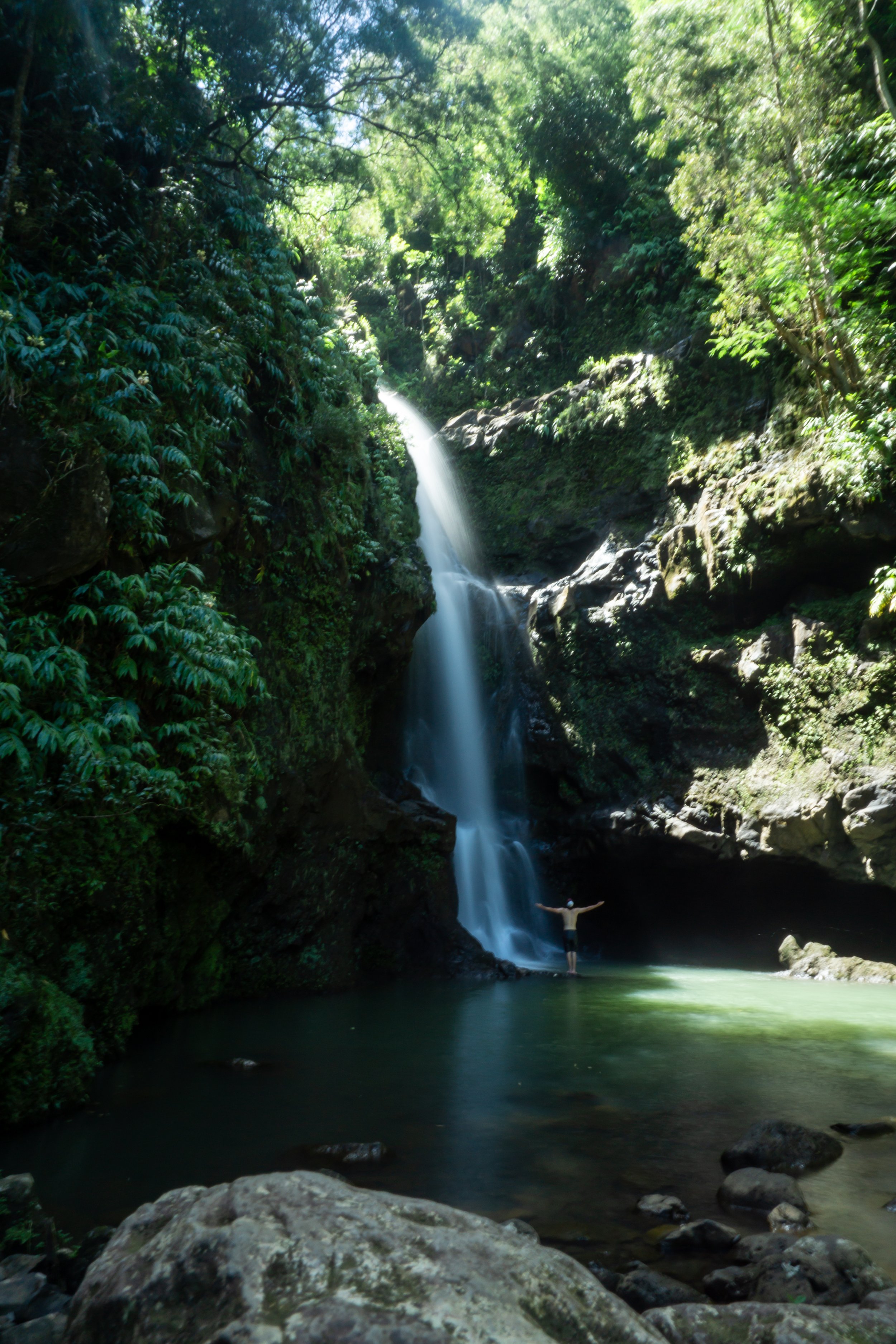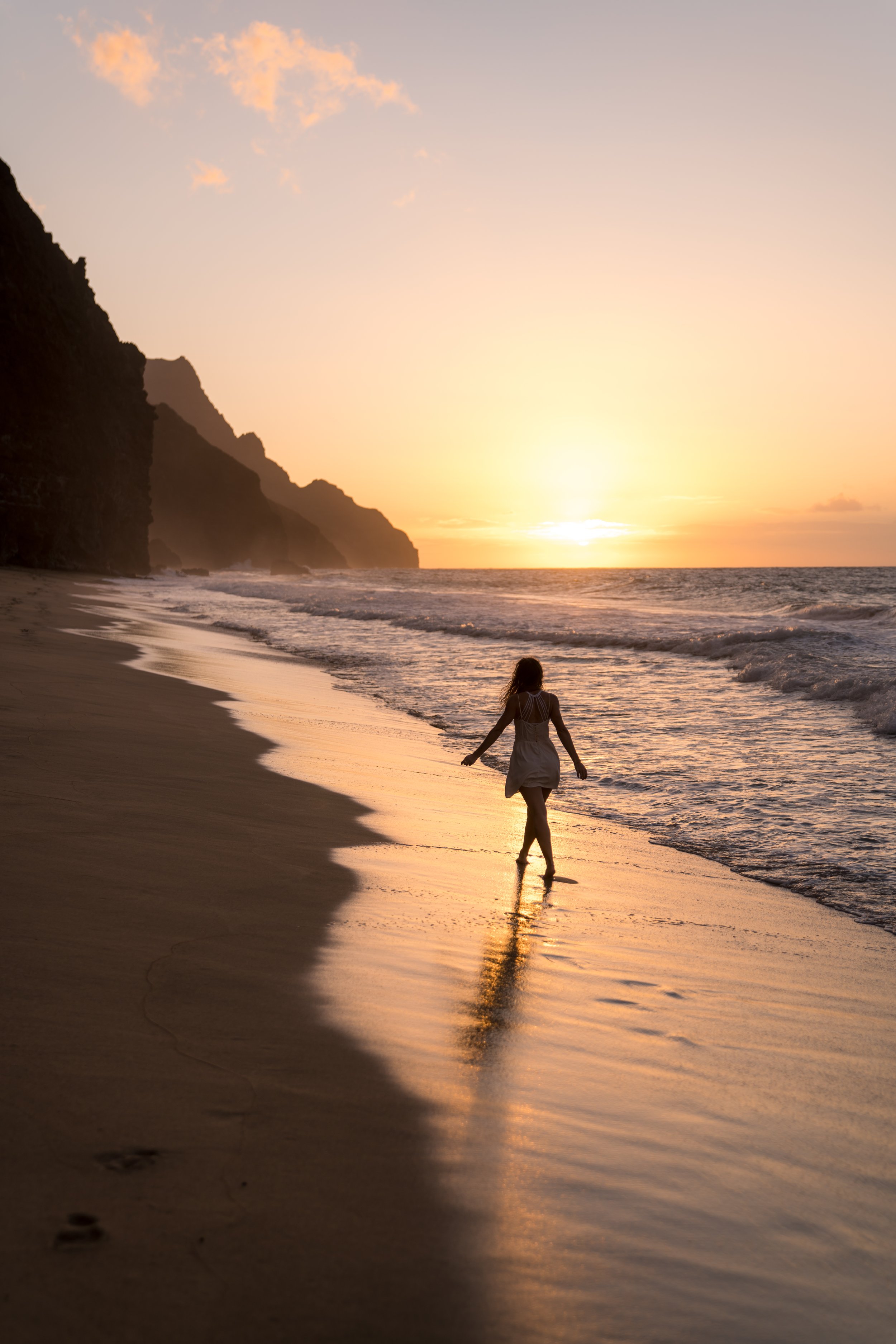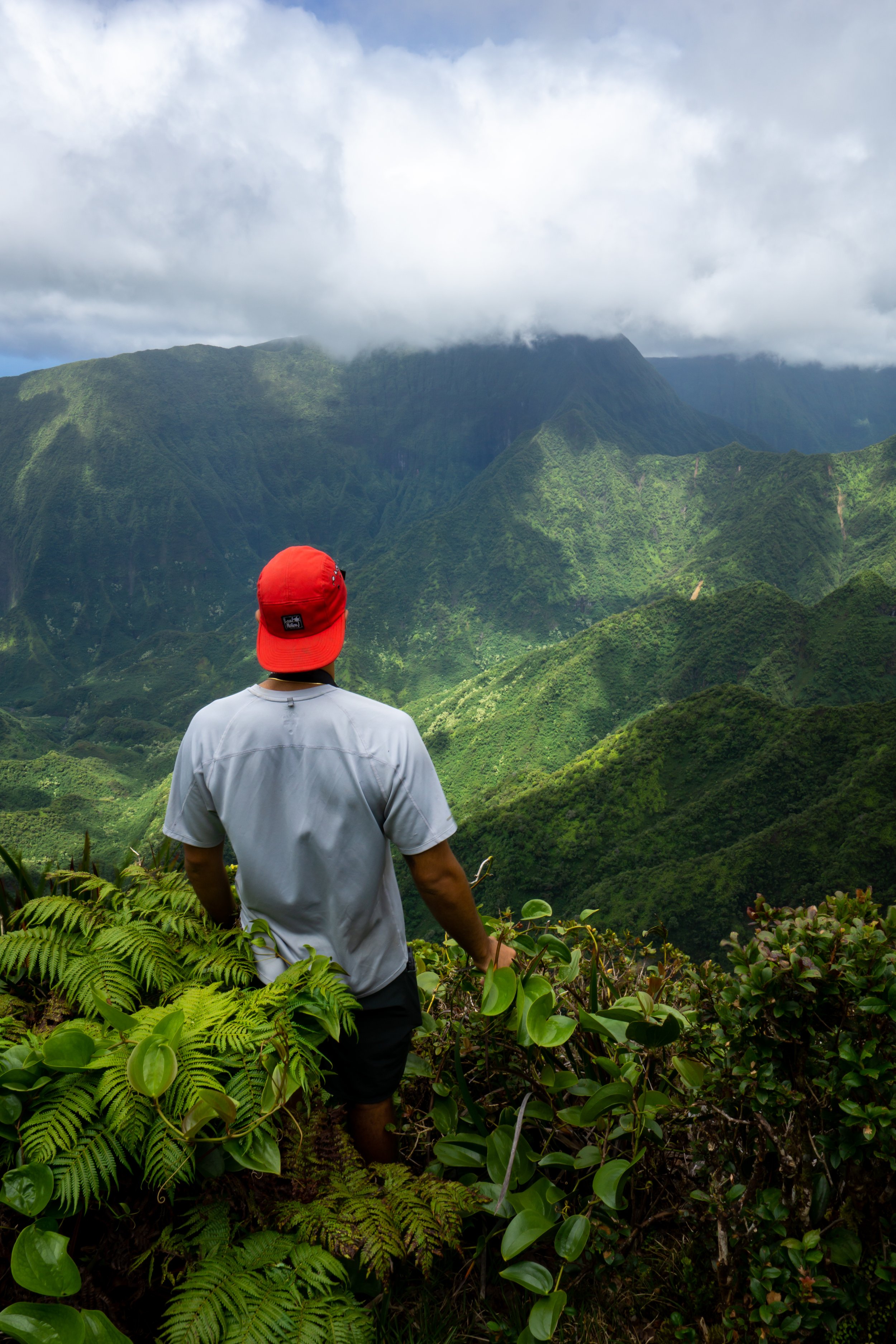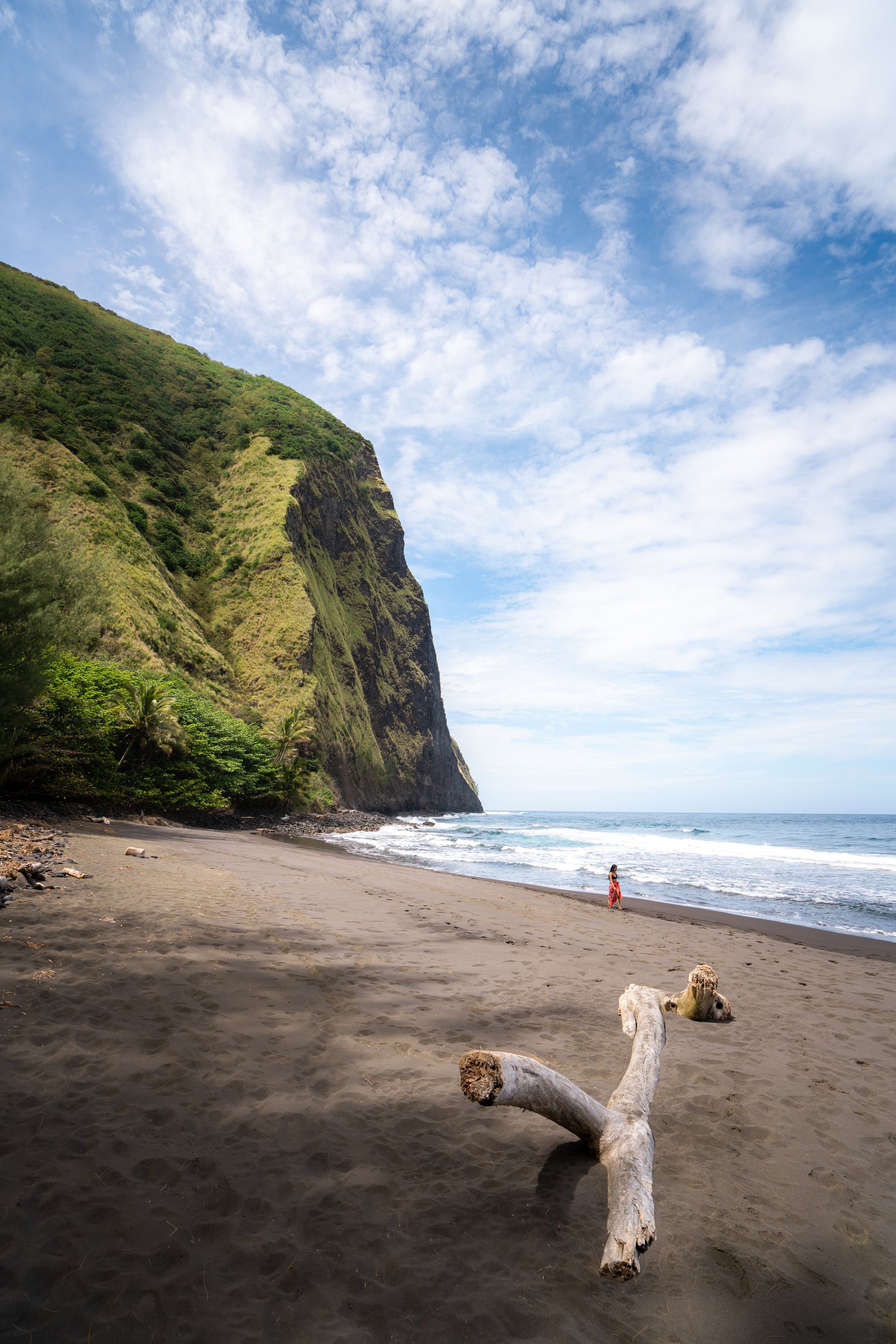Hiking the Lulumahu Ridge Trail to Puʻu Kōnāhuanui on Oʻahu, Hawaiʻi
Distance (Roundtrip): 4.6 miles / 7.4 km
Distance (Lulumahu Ridge to Nuʻuanu Trail): 9.0 miles / 14.5 km
The Lulumahu Ridge Trail to Puʻu Kōnāhuanui in the southern Koʻolau Mountains on Oʻahu is a short, steep, and truly unknown day hike to the summit of K1—inevitably making it the least-popular route to the top of the Koʻolau Range.
In comparison, the KST by way of the much more difficult Pali Notches Trail tends to be more popular, as hikers attempt to piece together sections of the summit trail.
In any case, I recommend against using the distances above as the deciding factor regarding which route you choose to take back down, as the Lulumahu Ridge Trail will more than likely be the slower and more challenging of the two routes because of how steep the climb is, with a total elevation gain of about 2,200 ft. (671 m) in just 2.3 miles (3.7 km).
That being said, the steep climb up Lulumahu Ridge certainly isn’t the most challenging hike on the island, as I would even say it’s 'easier' than the nearby Mt. Olomana on the other side of the Pali Highway.
Lulumahu Ridge Trailhead Parking
Parking for the Lulumahu Ridge Trailhead is located in the same dirt parking area as the Lulumahu Falls Trail, adjacent to the intersection for the Pali Highway and Nuʻuanu Pali Dr.
Out of caution, consider the Lulumahu Trailhead to be a high-crime area for petty theft, meaning you should never leave visible bags or anything valuable in your car.
Google Maps Directions: Lulumahu Ridge Trailhead
My Hawaiʻi Hiking Checklist
Osprey 3L Water Bladder - The Osprey 3L water bladder is the most universal hiking and backpacking water bladder on the market, and it’s my go-to because of the slide-off seal that allows it to be quickly filled from the top. Additionally, individual parts are easily replaceable, such as the bite valve.
Blister / Heel Protectors - I swear by these cheap, amazing heel protectors to prevent blisters for nearly every kind of hiking and backpacking that I do!
Black Diamond Headlamp - Personally, I recommend the Black Diamond Storm because it is one of the brightest, lightest, and longest-lasting headlamps on the market—and trust me, the weight-to-battery-life ratio really does matter!
Hiking / Trail Running Shoes - Depending on the type of trail, I prefer to use either the Keen Targhee for longer, more rugged hiking or the HOKA Zinal Trail-Running Shoe for lighter, less intense trails. In either case, both have been amazing to me for many years across countless environments, and both can be found in men’s and women’s sizes. - (Men’s Keen / Women’s Keen) (Men’s HOKA / Women’s HOKA)
Waterproof Rain Shell - You never know when it may rain, and I’ve learned over the years that a rain shell is far better than a rain jacket. By this, I mean that it’s best to have something that the water will roll right off of, which is why I recommend the Patagonia Torrentshell 3L available in both men’s and women’s sizes.
High SPF Sunscreen - Packing high-SPF sunscreen is a must for long days outside!
Hiking the Lulumahu Ridge Trail
Starting from the Lulumahu Falls Trailhead, the Lulumahu Ridge Trail begins here at either one of two entrances.
If you start at the entrance with the hunters log, you will begin in the bamboo forest before ending up on the gravel road. Alternatively, if you start at the entrance with the gate, you will begin on the gravel road and avoid the bamboo forest altogether.
For obvious reasons, I recommend the gate.
When the Lulumahu Falls Trail reaches the opening in the photo below, go straight.
Then, when the trail reaches the dam, you can either cross the stream and then cross again shortly after, or simply follow the stream up a short distance to the trail that’s located on the left-hand side.
Lulumahu Ridge-Lulumahu Falls Junction
After 0.6 miles (1.0 km), go left to begin the Lulumahu Ridge Trail, which will branch off from the popular Lulumahu Falls Trail.
A good indicator for finding the split is that the stream crossing in the photo above will be the last time you will cross the Lulumahu Stream for the rest of the hike.
That being said, many Hawaiʻi visitors trying to reach Lulumahu Falls end up on Lulumahu Ridge by mistake, but to know if you’re heading the right direction, the trail should start getting steeper in just a few minutes after leaving the Lulumahu Falls Trail.
Read My Separate Post: Lulumahu Falls Trail
In my experience, the lower sections of Lulumahu Ridge may be a little more vague than the rest, but try to follow the most obvious trail heading up the ridge.
Then, when the trail starts getting steeper, like the photo below, it will be a lot less confusing, as there is only one real path to follow.
On a different note, hiking pants are a must for the overgrowth once you leave the Lulumahu Falls Trail behind.
The pants below are my recommendations that hold up the best with the overgrowth here in Hawaiʻi, but with any hiking pants that need to be durable, make sure that they are at or near 100% nylon. This is really the most important factor!
Upper Lulumahu Falls Junction
While there is technically more than one Upper Lulumahu Falls, this is generally the one that most refer to, as it’s the route to rappel down the main Lulumahu waterfall.
That said, most hikers hiking up Lulumahu Ridge leave the ridge trail at this split to go down to the Lulumahu Stream.
However, stay straight on the ridge to the left to continue hiking up to Puʻu Kōnāhuanui.
Once above the lower canopy, the rest of Lulumahu Ridge to the summit is very straightforward.
However, these sections past the Upper Lulumahu Falls junction are where quality hiking pants become the most useful.
These views of the upper mountain in the do not show the true summit, but in terms of the entire hike, getting to the top of the false summit is roughly 99% of the way to the top.
This photo below is the part of Lulumahu Ridge where the views of K1, the true summit of Puʻu Kōnāhuanui, start to become visible.
Puʻu Kōnāhuanui (K1)
After 2.3 miles (3.7 km), the Lulumahu Ridge Trail ends at the summit of Puʻu Kōnāhuanui, also known for being the highest peak in the Koʻolau Mountains at 3,150 ft. (960 m).
Read My Separate Post: Koʻolau Summit Trail (KST)
Puʻu Kōnāhuanui Ridge
As previously mentioned, there are some things to consider regarding the route you choose to take back down. However, it is always my personal preference to return by way of the Puʻu Kōnāhuanui Ridge Trail, followed by the Nuʻuanu Trail, which is exactly what’s shown below.
This route completes the roughly 9.0-mile (14.5 km) loop trail mentioned previously, utilizing Nuʻuanu Pali Drive to walk the final stretch back to the Lulumahu Falls Trailhead.
Read My Separate Post: Puʻu Kōnāhuanui Ridge Trail
Pauoa Flats-Nuʻuanu Junction
Once past the Pauoa Flats Bench, look for the Nuʻuanu Trail on the right-hand side, which descends the final stretch back down to Nuʻuanu Valley.
Read My Separate Post: Nuʻuanu Trail
Nuʻuanu Stream
The last part of the Nuʻuanu Trail finishes on the Judd Loop Trail.
That being said, go right at the Judd Trail junction to hike out to Nuʻuanu Pali Drive on the shortest route.
Judd Trailhead
Once at the Judd Trailhead, go right to begin the final 0.8-mile (1.3 km) walk back to the Lulumahu Falls Trailhead.
Native Plants on Lulumahu Ridge
The Lulumahu Falls Trail is not the best place to look for native plants beyond the many Hau trees; however, once Lulumahu Ridge ascends above the lower canopy, there are tons of different native plants to find for the rest of the hike up to the summit.
Some of these include Kōpiko, various ʻŌhiʻa species, ʻAhakea lau nui, Alani, Kokolau and Kōlea, to truly only name a few.
If you would like to learn more about these and many other native Hawaiian plants from across the islands, I encourage you to check out my separate post linked below.
Read My Separate Post: Native Hawaiian Plant Guide
More Oʻahu Adventures
If you’re interested in reading about some more amazing Oʻahu adventures, check out my separate posts below!
Best Hotels & Restaurants in Waikīkī
If you’re trying to decided where to stay on Oʻahu, check out my top 10 list for the best resorts and restaurants in Waikīkī.
I break down what makes one hotel a better choice over another, so that you can find the best fit for your stay on the island.
Read My Separate Post: Best Waikīkī Hotels & Restaurants
HNL Airport-Hotel Shuttle
Prices on ride-share apps like Uber/ Lyft cannot beat the price of booking your hotel shuttle prior to arrival. I say this because there are additional fees for ride-share airport pick-ups at Honolulu Airport (HNL), which is why I recommend booking your transportation in advance using the options below.
Additionally, the last option below will go as far as the Ko ʻOlina Resorts on the West Side and Turtle Bay on Oʻahu’s North Shore!
Best Way to Book Rental Cars!
I travel quite a bit, and I know firsthand that finding a good rental car deal can be a challenge, but that’s why I recommend comparing all of your options with Discover Cars.
In short, Discover Cars is a well-known, reputable business that allows you to search for the best deal across companies, and they have the best full-refund cancellation policy I’ve ever seen, valid up to 72, or sometimes even 48, hours prior to your reservation!
Book Here: Discover Cars
Visiting Other Islands
If you are visiting Oʻahu or heading to another island, check out some of my personal recommendations for Oʻahu, Maui, Kauaʻi, Molokai, Lānaʻi, and Hawaiʻi Island (Big Island) in these separate posts.
If you’re trying to decide which island is right for your visit, check out my overview about each island in the post below.
Read My Separate Post: What is the Best Hawaiian Island to Visit?
What is the Best Time of Year to Visit Hawaiʻi?
The weather in Hawaiʻi can often appear to be warm and beautiful throughout the year, but in my experience, there is a lot more to consider when planning what time of year to visit the islands, such as what island you are considering, what sides of each island do you plan to stay, what activities are you most interested in, the wildlife, and countless other nuanced variables that can all impact the type of trip you can expect to have.
For these reasons, I highly recommend reading through my separate article to not only understand my thoughts regarding the best time of year to come to Hawaiʻi but also what you need to consider based on the time of year that you plan to visit.
Read My Separate Post: What is the Best Time of Year to Visit Hawaiʻi?
10 Best Tours & Excursions on Oʻahu
There are a lot of different tour options to choose from on Oʻahu, but to make it easier to decide, I made a list of my favorite tours because some things simply are better with a local guide!
Read My Separate Post: Best Tours on Oʻahu
Safety
All hikes in Hawaiʻi should not be compared to trails outside of the islands, and hikers should exercise due caution on every adventure, given that many are extremely dangerous.
By this, I mean that Hawaiʻi is known for hot, humid weather, steep, dramatic, and unstable cliffs, and flash floods, which can occur without warning. Therefore, it is important that you check the local forecast, understand the physical condition of your entire group, and pack sufficient food and water before attempting any adventure.
Disclaimer
All information provided on this blog is for informational purposes only and is not intended to be a substitute for information or advice from qualified professionals or managing agencies.
Noah Lang Photography LLC makes no representations or warranties regarding the accuracy or completeness of the information provided here, and readers should use their own discretion, judgement, and seek professional advice where it is appropriate.
Furthermore, Noah Lang Photography LLC shall not be held responsible for any injuries, lost individuals, or legal issues arising from the use of information provided on this website, and if applicable, the above safety disclaimer should be referenced to provide a generic overview of the risks involved.
All said, the content on this blog is for the sole use of Noah Lang Photography LLC, and unauthorized use or reproduction of this content is strictly prohibited.
Disclosure
This post is not sponsored.
However, some of the links in this post are affiliate links, which means that I may earn a small commission if a purchase is made through one of those links. This commission comes at no additional cost to you, and I only recommend products that I personally use and believe will add value to my readers. Thank you for your support, which enables me to continue creating more!
To read the full privacy policy, click here.
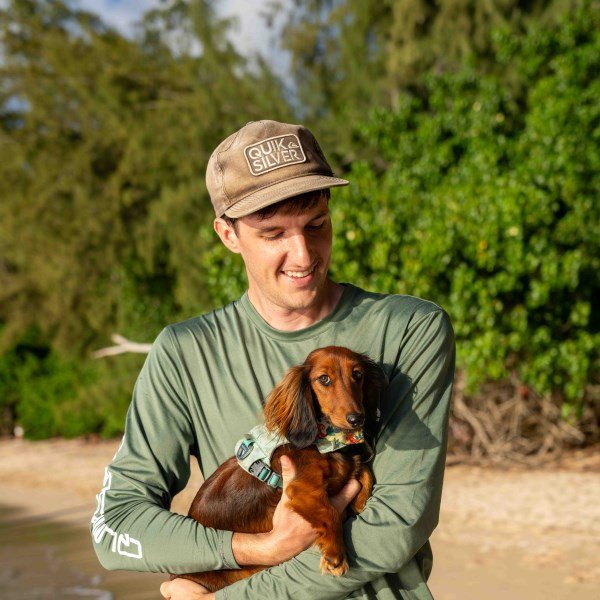
About This Blog
Noah Lang Photography, also known as @noahawaii, is 100% reader-supported!
I do not accept guest articles or sponsored content of any kind on my blog, which is why, if you enjoy the outdoor and travel content I create, please consider buying me a coffee!
I appreciate your support, which helps me continue to keep this blog alive!










